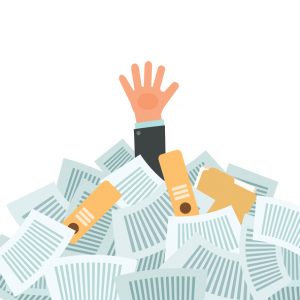
Good Lawyering Is Less Effective In Busy Courts
//
 Clients might believe that good lawyers will have the best impact on a court since they can advance the most persuasive arguments and convince a court to side with their position. Of course, it is true that when a court has the time to read all of the papers and carefully consider all of the arguments, the party which advanced the best points is usually the one that will prevail. However, some courts are so busy and have so little time to review papers and evaluate arguments that good lawyering is less effective in advancing a client’s position in such venues.
Clients might believe that good lawyers will have the best impact on a court since they can advance the most persuasive arguments and convince a court to side with their position. Of course, it is true that when a court has the time to read all of the papers and carefully consider all of the arguments, the party which advanced the best points is usually the one that will prevail. However, some courts are so busy and have so little time to review papers and evaluate arguments that good lawyering is less effective in advancing a client’s position in such venues.
Many state courts in a city in which I practice are extremely busy, mainly because the courts do not have the resources to handle the vast amount of cases that are filed. Whenever I go to these courts in person, it is astonishing to see the incredible number of other cases that are also being managed by the court, and I always wonder how the court can give each of these matters the attention they deserve.
googletag.cmd.push( function() { // Display ad. googletag.display( "div-id-for-top-300x250" ); });In order to deal with the volume of litigation, these courts adopt practices that make it difficult for good lawyering to shine through when handling a matter. Discovery disputes are handled by centralized systems in which the parties must mostly agree on discovery issues to move a case forward. Many of the courts also have expansive mediation services in an attempt to resolve as many cases as possible and alleviate the burden that the volume of litigation has on the judicial system.
 Sponsored Early Adopters Of Legal AI Gaining Competitive Edge In Marketplace How to best leverage generative AI as an early adopter with ethical use. From LexisNexis
Sponsored Early Adopters Of Legal AI Gaining Competitive Edge In Marketplace How to best leverage generative AI as an early adopter with ethical use. From LexisNexis These courts also tend to have some practices in place when it comes to handling dispositive motions. Perhaps the biggest indication that the courts are busy when it comes to dispositive motions is that these motions are rarely granted. The courts know that it is much easier to deny dispositive motions than to grant them, and they are much less likely to get overturned on appeal by doing so.
Moreover, if dispositive motions are denied, and cases get close to trial, it is likely that cases will settle, and the court will not need to deal with such matters in the future. Even if lawyers make great points, and outshine their adversaries at every turn, it is still difficult to break through the sheer volume of matters courts need to deal with to convince a court to grant a dispositive motion.
googletag.cmd.push( function() { // Display ad. googletag.display( "div-id-for-middle-300x250" ); }); googletag.cmd.push( function() { // Display ad. googletag.display( "div-id-for-storycontent-440x100" ); }); googletag.cmd.push( function() { // Display ad. googletag.display( "div-id-for-in-story-youtube-1x1" ); });Lawyers who want a court to better consider their arguments do have a few options. If they can get their cases into federal court, in my experience, it is more likely that their arguments will be more persuasive to a court. As I have seen in my practice, federal courts typically have more resources and smaller caseloads than state courts, and federal judges might have more bandwidth to consider interesting arguments that can help a client prevail. Some state courts also have specialized parts that deal with larger (often commercial) matters since they seem to understand ordinary state courts are overburdened, and these specialized courts can benefit lawyers wishing to receive more attention from a court.
I am not at all blaming judges and court officers for the practices they need to implement to deal with the sheer volume of cases they often handle, and these public servants work extremely hard to ensure that matters get the most attention possible. Legislatures should likely give courts more resources so that judges and court officers are not overburdened with voluminous dockets. However, lawyers and clients should understand that in some legal contexts, courts are simply too overburdened to provide their utmost attention to a matter, and good lawyering might not be helpful in these situations. Understanding this could impact case strategy and the forum in which parties wish to litigate.
Sponsored Sponsored Profit Powerhouse: Elevating Law Firm Financial Performance In this CLE-eligible webinar on April 10th, we’ll explore the most common accounting pitfalls and how to avoid them for your firm. From Pilot and Above The Law
Sponsored Profit Powerhouse: Elevating Law Firm Financial Performance In this CLE-eligible webinar on April 10th, we’ll explore the most common accounting pitfalls and how to avoid them for your firm. From Pilot and Above The Law  Sponsored This AI-Powered Document Tool Will Meet You Where You Are Lexis Create provides simple access to internal and external knowledge — directly within Microsoft Word. From Ethan Beberness
Sponsored This AI-Powered Document Tool Will Meet You Where You Are Lexis Create provides simple access to internal and external knowledge — directly within Microsoft Word. From Ethan Beberness  Sponsored How Generative AI Will Improve Legal Service Delivery
Sponsored How Generative AI Will Improve Legal Service Delivery  Sponsored Profit Powerhouse: Elevating Law Firm Financial Performance In this CLE-eligible webinar on April 10th, we’ll explore the most common accounting pitfalls and how to avoid them for your firm. From Pilot and Above The Law
Sponsored Profit Powerhouse: Elevating Law Firm Financial Performance In this CLE-eligible webinar on April 10th, we’ll explore the most common accounting pitfalls and how to avoid them for your firm. From Pilot and Above The Law  Jordan Rothman is a partner of The Rothman Law Firm, a full-service New York and New Jersey law firm. He is also the founder of Student Debt Diaries, a website discussing how he paid off his student loans. You can reach Jordan through email at [email protected].
Jordan Rothman is a partner of The Rothman Law Firm, a full-service New York and New Jersey law firm. He is also the founder of Student Debt Diaries, a website discussing how he paid off his student loans. You can reach Jordan through email at [email protected].
 Sponsored Early Adopters Of Legal AI Gaining Competitive Edge In Marketplace How to best leverage generative AI as an early adopter with ethical use. From LexisNexis
Sponsored Early Adopters Of Legal AI Gaining Competitive Edge In Marketplace How to best leverage generative AI as an early adopter with ethical use. From LexisNexis  Sponsored Legal AI: 3 Steps Law Firms Should Take Now If 2023 introduced legal professionals to generative AI, then 2024 will be when law firms start adapting to utilize it. Things are moving fast, so… From LexisNexis Topics
Sponsored Legal AI: 3 Steps Law Firms Should Take Now If 2023 introduced legal professionals to generative AI, then 2024 will be when law firms start adapting to utilize it. Things are moving fast, so… From LexisNexis Topics Biglaw, Courts, Jordan Rothman, Small Law Firms
Introducing Jobbguru: Your Gateway to Career Success
The ultimate job platform is designed to connect job seekers with their dream career opportunities. Whether you're a recent graduate, a seasoned professional, or someone seeking a career change, Jobbguru provides you with the tools and resources to navigate the job market with ease.
Take the next step in your career with Jobbguru:
Don't let the perfect job opportunity pass you by. Join Jobbguru today and unlock a world of career possibilities. Start your journey towards professional success and discover your dream job with Jobbguru.
Originally posted on: https://abovethelaw.com/2024/03/good-lawyering-is-less-effective-in-busy-courts/